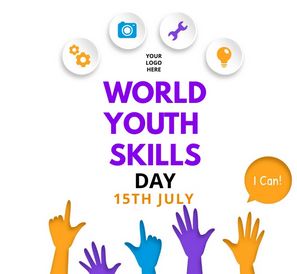ISLAMABAD, JUL 15 /DNA/ – The Pakistan Youth Development Dialogue 2025 marked an inspiring celebration of World Youth Skills Day, bringing together a powerful mix of policymakers, corporate executives, nonprofit leaders, and youth advocates. The core message of the conference centered on empowering young people through digital skills, inclusive education, and climate leadership to help shape a resilient and sustainable future for Pakistan. The conference was organized by Development Communications Network (Devcom-Pakistan) on Tuesday at a local hotel.
A key highlight of the event was the official launch of the Pakistan Youth Development Network under the leadership of Munir Ahmed, Executive Director Devcom-Pakistan. With over three decades of pioneering work in development communication, climate advocacy, and youth empowerment, Munir Ahmed emphasized the need for cohesive and inclusive national platforms to connect young people with skills development opportunities and policy-level engagement.
Federal Minister for Board of Investment, Qaiser Ahmed Sheikh, in his keynote address as the chief guest, emphasized the government’s commitment to creating an enabling environment for youth to thrive as contributors to national growth. He said that youth are the most valuable asset of Pakistan, and investing in their skills and entrepreneurship is the only path toward sustainable economic development. “Today’s rapidly evolving global economy demands a workforce that is adaptable, tech-savvy, and innovative. We need to align our national policies with this reality and ensure that our young population is not left behind,” he noted.
Mr. Sheikh further highlighted the importance of public-private partnerships in building a strong foundation for youth empowerment. He appreciated initiatives like the Pakistan Youth Development Dialogue and the newly launched Pakistan Youth Development Network for offering a strategic platform where government, corporate, and civil society stakeholders can come together for collective action.
Founder of the Pakistan Youth Development Network and Executive Director of Devcom-Pakistan, Munir Ahmed, in his address, underscored the urgent need for a unified and inclusive approach to youth development in Pakistan. He stated that while the youth make up over 60 percent of the country’s population, they often remain disconnected from policy processes and development planning. “We cannot afford to let this demographic dividend turn into a liability. The Pakistan Youth Development Network is a step toward creating a nationwide platform that links young people to skills development, policy engagement, and leadership opportunities,” he said.
Munir Ahmed also emphasized the importance of equipping youth with digital, entrepreneurial, and climate resilience skills to meet the challenges of the 21st century. He called on government institutions, the corporate sector, and development organizations to work collaboratively in empowering youth from all backgrounds, including marginalized and remote communities. “We are not just celebrating World Youth Skills Day — we are launching a movement that aims to make skills, innovation, and inclusion the cornerstone of national development,” he concluded.
The National Bank of Pakistan was honored with three special awards for girls’ education, engaging youth in green banking, and for youth skills development for its consistent contributions to youth skills development over the years. Shoaib Qaisrani, Head of the North Region, accepted the awards on behalf of the institution.
Speakers at the conference delivered insightful and action-driven remarks. Saquib Ahmed, Managing Director of SAP for Pakistan, Afghanistan, Bahrain, and Iraq, said, “The changing landscape of AI and digital transformation is creating new economic and social frontiers. But the real opportunity lies in equipping our youth with the right digital competencies and opening pathways for them to lead this transformation.”
Fatima Shuja, Stream Head Marketing Finance at Jazz Telecom, highlighted the intersection of telecom and youth inclusion. “Through targeted initiatives and inclusive innovation, we can convert digital access into real economic opportunities — especially for women and underserved communities,” she said.
On the theme of girls’ education and the role of nonprofit and CSR, Fajer Rabia Pasha, Executive Director of Pakistan Alliance for Girls Education (PAGE), noted, “Education is not just about literacy, it’s about dignity and empowerment. Through collective efforts of civil society and corporate partners, we can bring transformative change to the lives of girls in marginalized communities.”
Renowned environmentalist Dr. Ejaz Ahmed delivered the keynote address during the session on “Young Climate Leaders for Local Adaptation,” highlighting the critical role of youth in confronting the climate crisis. Drawing on his extensive experience in biodiversity conservation and community-based adaptation, he stressed that the voices and actions of young people are essential to building climate-resilient societies. “Young leaders are not just the future — they are the present drivers of change. Their local knowledge, creativity, and passion must be harnessed to develop context-specific adaptation strategies,” he said.
Dr. Ahmed emphasized that “Adaptation must begin at the community level, and youth are best placed to lead this transformation. Institutions, both public and private, must step up to provide them with the tools, mentorship, and resources they need to innovate and lead,” he added.
The dialogue concluded with a powerful climate-focused session. Dr. Mehwish Ramzan, Head of ESG at Jazz Telecom, pointed out that “corporate entities must move beyond tokenism and lead with purpose — aligning sustainability strategies with global frameworks like the CSRD and involving youth in actionable climate solutions.”
Umair Mufakir, President of Native Youth for Climate Change, emphasized the importance of local and indigenous knowledge. “Youth from remote and native communities are at the frontline of climate impacts — their voices must be central to any adaptation plan. Inclusion is not optional, it is essential.”
The dialogue closed with a call to action for more integrated and youth-centered development policies, collaborative programming, and strong public-private-nonprofit alliances to harness the full potential of Pakistan’s young population.

















